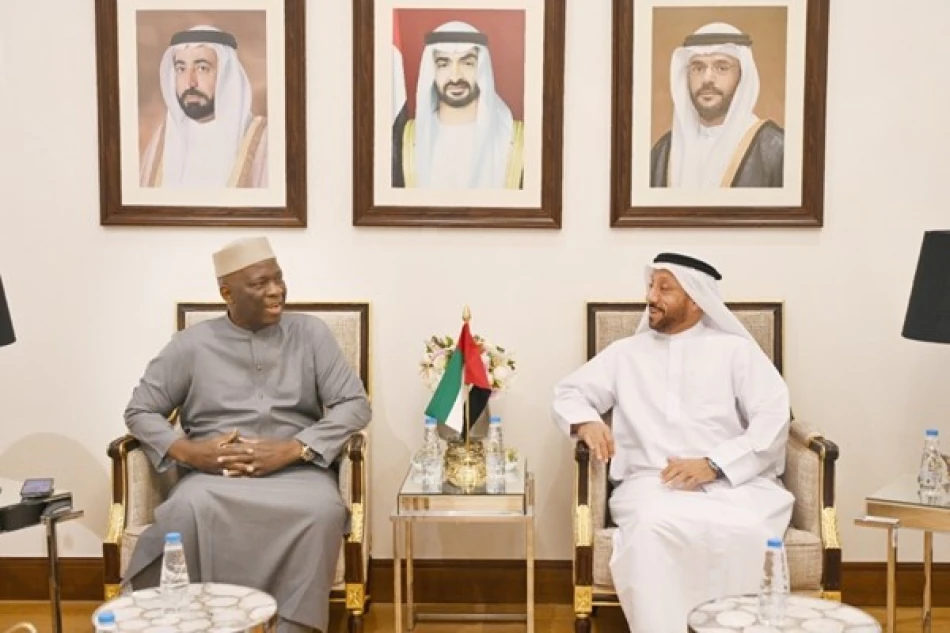
Unlock Investment Opportunities: UAE Chambers Explore Prospects with Mali
UAE and Mali Eye Strategic Partnership as Gulf Capital Seeks New African Frontiers
The UAE is positioning itself for deeper economic ties with Mali as Emirati chambers of commerce showcase investment opportunities spanning renewable energy, infrastructure, and mining during a high-level business delegation visit. The move reflects the Gulf state's broader strategy to diversify investments beyond traditional markets while Mali seeks foreign capital to develop its resource-rich economy.
Strategic Timing for Gulf-Africa Expansion
The UAE-Mali business forum, hosted by the Sharjah Chamber of Commerce in cooperation with the UAE Chambers Federation and Ministry of Foreign Affairs, comes as Gulf states increasingly look toward Africa for investment diversification. Abdullah Sultan Al Owais, Vice President of the UAE Chambers Federation and Chairman of Sharjah Chamber, welcomed the Malian trade delegation during their August 13-18 visit, emphasizing how these opportunities align with the UAE's economic diversification plans.
This timing is particularly strategic as global investors reassess emerging market exposure amid shifting geopolitical dynamics. The UAE's approach mirrors similar outreach efforts by other Gulf Cooperation Council members who have been expanding their African investment portfolios over the past decade.
Sector-Specific Investment Pipeline
Infrastructure and Energy Leading the Charge
The Malian delegation, led by Madio Sembara, President of Mali's Chamber of Commerce and Industry, presented a comprehensive portfolio of investment opportunities. Key sectors include renewable energy projects, artesian well development, infrastructure development, and the construction of a major commercial complex and international hospital.
These sectors align closely with UAE expertise, particularly given the Emirates' experience in large-scale infrastructure projects and renewable energy development. The UAE's mastery of desert solar technology and water management systems could prove especially valuable in Mali's Sahel environment.
Mining and Agriculture: Untapped Potential
The focus on mining and agriculture represents significant opportunities for Emirati investors. Mali is Africa's third-largest gold producer and has substantial deposits of other minerals, while its agricultural sector remains underdeveloped despite favorable conditions in southern regions.
Institutional Framework for Long-Term Partnership
Both sides are working toward signing a memorandum of understanding to establish a joint business council, creating a direct communication platform between private sector representatives. This institutional approach suggests both countries view this as more than opportunistic deal-making, instead building sustainable long-term economic ties.
The proposed framework would facilitate cooperation across agriculture, food security, infrastructure, energy, and mining sectors—areas where UAE companies have demonstrated competitive advantages in other African markets.
Market Implications and Regional Context
For investors, this partnership represents the UAE's continued evolution from a regional trading hub to a global investment platform. The Emirates' success in similar partnerships with countries like Egypt and Morocco provides a proven template for Mali engagement.
The initiative also reflects Mali's urgent need for foreign investment following years of political instability. The country's 2020 and 2021 military coups initially deterred international investment, but recent stabilization efforts appear to be reopening opportunities for patient capital.
Unlike Western investors who may face political constraints regarding Mali engagement, Gulf states maintain more flexible diplomatic relationships across Africa, potentially giving UAE companies a competitive advantage in accessing these markets.
Challenges and Opportunities Ahead
While the opportunities are substantial, UAE investors will need to navigate Mali's complex security environment and regulatory framework. However, the UAE's experience operating in challenging markets across the Middle East and Africa positions Emirati companies well for these realities.
The success of this partnership could serve as a model for broader UAE-Sahel engagement, potentially opening doors to similar arrangements with neighboring countries like Burkina Faso and Niger, creating a regional investment corridor for Gulf capital.
Most Viewed News

 Layla Al Mansoori
Layla Al Mansoori






